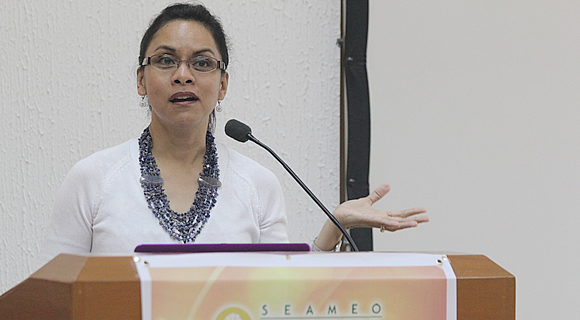
Publishing research in peer-reviewed journals doesn’t only contribute to the ever growing body of knowledge it is also critical to building the expertise and reputation of a researcher as well as to achieving job tenure. Conducting significant research is one thing, but getting this published in high impact refereed journals is another story.
On 19 July 2012 Dr. Mia Liza A. Lustria, associate professor of Florida State University and a SEARCA graduate alumna (MS development communication, 1996) conducted a seminar for SEARCA scholars entitled “Publish or Perish: How to Get Published in Peer-Reviewed Journals”. The talk was a practical take on academic publishing drawn largely from her own experiences trying to get published in international peer-reviewed journals including her successes and challenges. The very timely seminar did not only catch the interest of SEARCA scholars, but also that of other university students, some members of the Los Baños Science Community, and even UPLB alumni currently teaching in Ateneo and La Salle.
Dr. Lustria emphasized that choosing the right journal to submit to is critical to the publication process and can inform how a researcher should present his/her research even in the early stages of writing. In addition to understanding the scope and focus of the journal, it is also important to assess the journal’s reputation and impact as well as its reach and accessibility, particularly to scholars who are most likely to do similar research. In addition to these, Dr. Lustria said that it’s also important to consider the peer review process espoused by the journal and the average turn around time from submission to acceptance and eventual publication.
“Fear of rejection is perhaps one of the main reasons I hesitate to submit my work to peer-reviewed journals”,” admitted Dr. Lustria, “reviewers are reputable experts in their field, so it can be particularly rattling to have your work examined so closely for its scientific merit.” She pointed out that peer review, however, is crucial to publishing high quality, relevant, and credible research. “It is the reviewers’ job to provide critical and comprehensive feedback and you need to remember this when you submit your work for publication.”
Authors can receive one of four decisions for submitted work: (1) accept, (2) resubmit with minor revisions, (3) resubmit with major revisions, or (4) reject. In this regard, Dr. Lustria asked the audience what they thought is the most common decision. “Actually authors are mostly likely to receive a decision to revise and resubmit. Consider that as a good thing and an opportunity for you to refine your thoughts and to address flaws pointed out in the reviews. It’s not the end of the world.”
Dr. Lustria then gave useful tips on how to address reviewers’ comments and how to refine manuscripts—illustrating how this can be done by sharing examples from her own work, including manscripts that had initially been rejected but later published. She also relayed different ways researchers can maximize their chances of getting published and increase their productivity, including: (1) editing the manuscript carefully with an eye to improve both the substance and presentation, (2) finding good writing partners, (3) doing collaborative research, and (4) finding a good mentor, among others.
She ended her talk by emphasizing that getting a research manuscript published in a peer-reviewed journal is only the first step and should not be the end goal of the researcher. “What you really need to aim for is to produce high quality work that will be recognized by other experts in your field and that will be highly cited.”
Prior to pursuing her doctoral degree at the University of Kentucky in 2000, Dr. Lustria taught at the College of Development Communication at the University of the Philippines Los Banos for 10 years. She is now a tenured faculty at the School of Library and Information Studies at Florida State University and has a courtesy appointment with the FSU College of Medicine. She has a successful record of peer-reviewed publications and external grant funding in health informatics and health communication. She has published in and reviewed for a number of high impact journals, including: Journal of Health Communication, Journal of Medical Internet Research, Health Communication, Communication Research, Health Informatics Journal, Journal of the American Society for Information Science & Technology, Patient Education and Counseling, Health Education and Behavior, to name a few.
